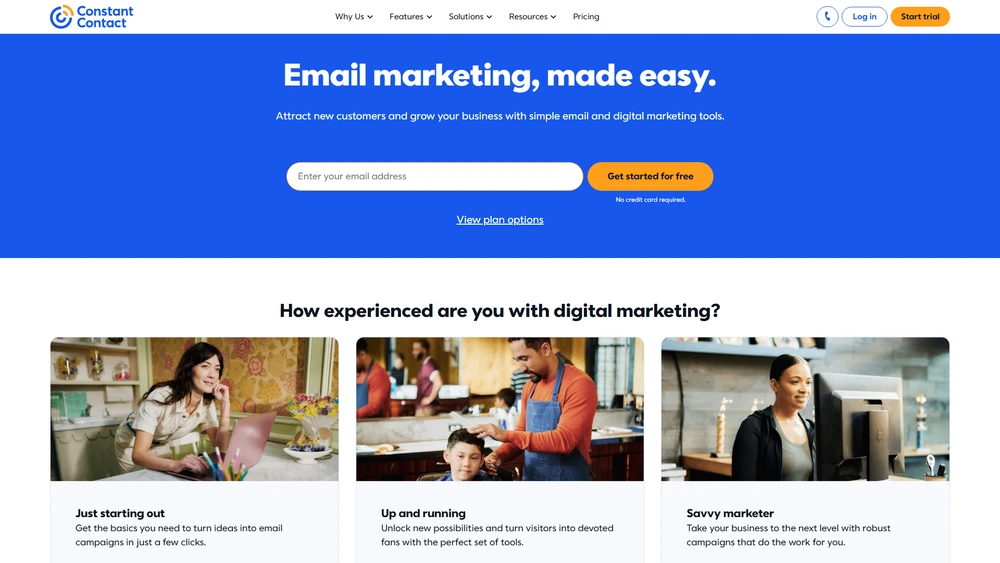Constant Contact Overview & 2026 Industry Position
Constant Contact remains an essential name in email marketing and small business CRM. In 2026, it continues to evolve beyond templated email campaigns by integrating AI content tools, enhanced marketing automation, and real-time analytics. The platform is specifically optimized for SMBs who prioritize results without technical complexity.
As digital touchpoints diversify, Constant Contact positions itself as a growth partner, offering tools that unify email, SMS, surveys, social media, and event marketing—across campaigns that are easy to build and track. In its 2025 lineup, Constant Contact introduces deeper CRM-style engagement features and AI-created campaigns tailored to industry verticals.
From Launch to 2026: Constant Contact’s Journey
Founded in 1995, Constant Contact was among the first platforms to make email marketing accessible to small businesses. Originally a simple template builder, the company pivoted in the early 2000s to include contact management, forms, and reporting. Key milestones include:
- 2007: IPO on NASDAQ
- 2014: Launch of integrated social marketing tools
- 2015: Acquired by Endurance International
- 2021: Acquired by Clearlake Capital; major UI overhaul
- 2023: Launch of AI content assistant for email and social
- 2025: Expansion into vertical-based campaign templates powered by machine learning
Constant Contact’s 2026 strategy focuses on becoming the all-in-one marketing suite for SMBs—removing friction and adding intelligence to every customer touchpoint.

Constant Contact Key Features
Constant Contact’s 2025 suite includes far more than traditional newsletters. Its key features demonstrate a growing emphasis on customer lifecycle management and omnichannel outreach:
- AI Content Assistant: Generates subject lines, body copy, and social posts tailored to industry/goal.
- Email Automation Builder: Drag-and-drop UX to create multi-step autoresponders triggered by contact behavior.
- Social Scheduling & Ads: Manage Facebook, Instagram, and Google Ads directly from the dashboard.
- SMS Campaigns: Integrate text messaging into your automation workflows and contact records.
- Event Management: RSVP tracking, registration forms, and ticketing for hybrid and in-person events.
- Landing Pages & Lead Forms: Mobile-optimized pages with easy form capture and tag routing.
- Commerce tools: Basic storefront features for digital product selling, payment collection, and promo codes.
Workflow & UX
Constant Contact’s user interface continues to be built for non-technical users. The 2025 version features:
- A visual campaign planner with clear progression from template selection to automation triggers.
- Real-time previews on mobile and desktop, with one-click reformatting.
- Unified campaign dashboard to view performance metrics across email, social, and SMS.
- Intuitive segmentation builder that dynamically shows audience reach.
The platform benefits from minimalist design choices that help users focus. Onboarding flows are hands-on and contextual, often surfacing example flows, tips, and relevant premade automations.
Constant Contact Pricing Analysis & Value Metrics
As of July 2026, Constant Contact offers three primary plans with optional add-ons for SMS volume, event management, and e-commerce. Key price points:
| Plan | Monthly Price | Includes |
|---|---|---|
| Lite | $12/mo | Basic email, 1 user, lead capture forms |
| Standard | $45/mo | Email + social + AI writing + automation flows |
| Premium | $80/mo | Multichannel campaigns, dynamic content, integrations |
All tiers include real-time reporting and mobile preview. Deliverability optimization, list cleaning, and email scheduling are native—even on the Lite plan. Best value: Standard plan.
Competitive Landscape
Constant Contact competes within both the email marketing and lightweight CRM categories. Here’s how it compares to key alternatives:
| Competitor | Strengths | Ideal For |
|---|---|---|
| Mailchimp | Brand familiarity, free plan, deeper e-comm options | Budget teams, Shopify users |
| MailerLite | Best low-cost automations, modern UI | Freelancers and bootstrapped startups |
| ActiveCampaign | Complex workflows, CRM-rich | Advanced marketers and midsize orgs |
| HubSpot | Scalable CRM & full suite | B2B lead gen, large teams |
Popular Use Cases
- Local retail stores sending promotional emails and SMS coupons
- Consultants nurturing leads via autoresponder funnels
- Event planners using RSVP and calendar integrations
- Nonprofits running monthly donor and volunteer newsletters
Constant Contact Integrations
Constant Contact connects natively with a wide array of business tools across major ecosystems:
- E-commerce: Shopify, WooCommerce, BigCommerce
- CRM: Salesforce, Zoho, Pipedrive
- Online payments: PayPal, Stripe
- Booking: Eventbrite, Calendly
- Site builders: WordPress, Wix, Squarespace
Segment sync and trigger-based actions streamline how users feed leads between platforms.
Pros & Cons
- Pros:
- Streamlined UX for non-marketers
- Smart automation journeys with AI enrichment
- Multichannel campaign orchestration in one hub
- Affordable mid-tier pricing
- Cons:
- Event/commerce add-ons cost extra
- Fewer advanced CRM features compared to full-suite rivals
- Email design templates feel outdated without customization
Pro Tip: Use AI-generated suggestions for subject lines—but A/B test them with your own list segments for better open rate insights.
Final Thoughts
Constant Contact continues to dominate the SMB marketing space by balancing simplicity with strategic sophistication. It’s best suited for business owners, solopreneurs, and marketers who manage multiple channels without deep technical workflows. While it lacks the full functionality of B2B CRMs like HubSpot, its streamlined dashboard and evolving AI capabilities make it an excellent long-term growth tool.
Constant Contact FAQ
No. As of July 2026, Constant Contact offers a 14-day free trial but no ongoing free tier.
Yes. SMS capabilities are included in Standard and Premium plans with messaging volume add-ons.
Yes. The platform includes consent checkboxes, unsubscribe links, and contact management required by law.
Retail, nonprofits, health & wellness, real estate, coaching, and event-based businesses see strong results.
Yes. Bulk importing via CSV or direct integration with Google Contacts is supported.

